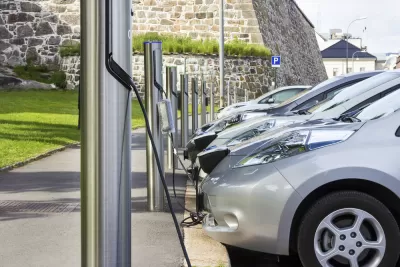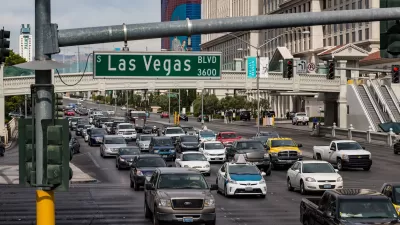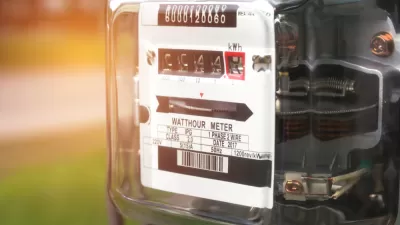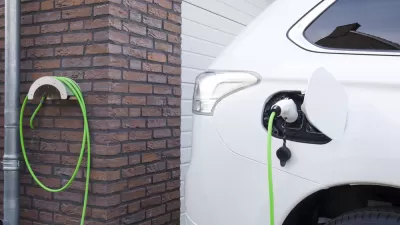Some may find it silly to get worked up over an annual fee of about $100 to pay for road maintenance when electric vehicle purchasers receive a $7,500 federal tax credit, on top of generous state perks, but electric vehicle supporters object to them.

Ideally, all motor vehicles would pay a fee for each mile driven, so that electric vehicles, which pay no gas taxes for road upkeep, would be treated no differently than gas-consuming vehicles, like some motorists are now doing in Oregon.
However, the road usage charge, as most of these fees are called, are many, many years away, and the need to maintain roads is pressing. Consequently, ten states, according to Car and Driver, apply an annual electric vehicle (EV) fee between $50 and $200. [Also see U.S. Department of Energy, "November 30, 2015: States Assessing Fees On Electric Vehicles To Make Up For Lost Fuel Tax Revenue.]
In addition, "[s]ince the start of 2017, six states (Indiana, South Carolina, Kansas, Tennessee, New Hampshire, and Montana) have introduced legislation that would require EV owners to pay a fee of up to $180 a year," report Gina Coplon-Newfield and Maggie Newsham for the Sierra Club.
On the other hand, "[a]t least 37 states and the District of Columbia have current incentives—as of June 2015," for electric vehicles, according to the National Conference of State Legislatures. Also see the latest perks, December through February, that were issued to EVs in California, Delaware, Hawaii, Massachusetts and New York, posted by the U.S. Energy Department.
Rather than seeing these annual fees as a means for state governments to have EV owners help maintain the roads they operate on, David Roberts, energy and climate change reporter for Vox, sees them as "directly chipping away at support for EVs," which are already under siege:
The oil industry — which now faces a serious threat if more optimistic EV forecasts play out — does not like these policies one bit. To complement their ongoing war on solar power, the Koch brothers are organizing a $10 million a year campaign against pro-EV public policies under the banner of “Fueling US Forward.”
It is, in creepy Koch fashion, courting minorities by seeking to convince them that EV policies hurt their communities. ALEC, the state-level right-wing group that writes “model policies” for state Republicans, recently passed a "Resolution Regarding Subsidies for Electric Vehicles.” (Spoiler: They’re against.)
Roberts recognizes that state governments are pressed for infrastructure funds, pointing to the federal gas tax still stuck at 1993 levels. State governments are doing better, though at least 17 states haven't increased their gas taxes in over 20 years, according to the Institute on Taxation and Economic Policy.
Roberts asserts, "It is perverse for states to... inhibit this emerging market with new fees, in pursuit of a relatively paltry amount of revenue."
Clearly electric vehicles can not be held responsible for plummeting gas tax revenues.
The impact of 540,000 electric vehicles on the roads in the United States not paying gas taxes "is dwarfed by other factors, most notably construction cost inflation and fuel-economy improvements in gasoline-powered vehicles," wrote Carl Davis of the Institute on Taxation and Economic Policy in an email. Those improvements may come to a halt, though, if Environmental Protection Agency Administrator Scott Pruitt has his way.
As noted in an earlier post on these fees, legislation that increases state gas taxes may be an appropriate place to ensure that all vehicles contribute toward road infrastructure.
Take California, for example. Sen. Jim Beall is proposing to "increase the price-based gas excise tax by 7.5¢ per-gallon; adjust the diesel excise tax by 20¢ per-gallon; and increase the diesel sales tax by 4 percent," according to his Feb. 14 press release on S.B.1 passing its first senate committee.
The main concern that two senate Democrats have about the $100 EV fee in the legislation is that it is not high enough, according to Melanie Curry of Streetsblog California.
Senators Wiener (D-San Francisco) and Allen (D-Santa Monica) called for more investment in transit, and senators Wieckowski (D-Fremont) and Skinner (D-Berkeley) urged Beall to consider a higher fee on electric vehicles to better match what the average gas-burning car driver would pay in increased taxes.
“I understand the need to encourage people to buy and use electric vehicles,” said Senator Nancy Skinner. “But this is about paying for maintaining the roads we all drive on.”
Hat tip to Gina Coplon-Newfield, Director of the Sierra Club's Electric Vehicles Initiative.
FULL STORY: Buying an electric vehicle? A growing list of states will charge you extra yearly fees.

Trump Administration Could Effectively End Housing Voucher Program
Federal officials are eyeing major cuts to the Section 8 program that helps millions of low-income households pay rent.

Planetizen Federal Action Tracker
A weekly monitor of how Trump’s orders and actions are impacting planners and planning in America.

Ken Jennings Launches Transit Web Series
The Jeopardy champ wants you to ride public transit.

California Invests Additional $5M in Electric School Buses
The state wants to electrify all of its school bus fleets by 2035.

Austin Launches $2M Homelessness Prevention Fund
A new grant program from the city’s Homeless Strategy Office will fund rental assistance and supportive services.

Alabama School Forestry Initiative Brings Trees to Schoolyards
Trees can improve physical and mental health for students and commnity members.
Urban Design for Planners 1: Software Tools
This six-course series explores essential urban design concepts using open source software and equips planners with the tools they need to participate fully in the urban design process.
Planning for Universal Design
Learn the tools for implementing Universal Design in planning regulations.
Ada County Highway District
Clanton & Associates, Inc.
Jessamine County Fiscal Court
Institute for Housing and Urban Development Studies (IHS)
City of Grandview
Harvard GSD Executive Education
Toledo-Lucas County Plan Commissions
Salt Lake City
NYU Wagner Graduate School of Public Service





























